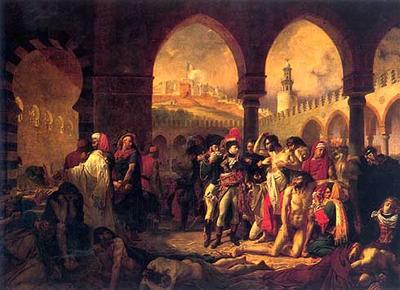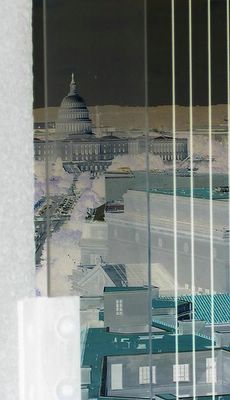WEEKEND UPDATE: Death and Destruction
 "Bonaparte visiting the plague victims of Jaffa" by Antoine-Jean Gros (1771-1835)
"Bonaparte visiting the plague victims of Jaffa" by Antoine-Jean Gros (1771-1835)Good morning. There seems to be a mixed bag of news regarding one's increased likelihood of premature death, or general destruction due to natural or manmade disasters.
1.) THE SITUATION IN NORTHERN PAKISTAN seems to be deteriorating. News reports say that more than 20,000 people have died in the massive earthquake there. That number seems like it could increase as more remote areas are surveyed.
>>"Quake toll tops 20,000 in stricken Pakistan, India" [Reuters]
2.) IT LOOKS LIKE I AM AT AN INCREASED RISK of becoming obese or develop skin cancer because of my late-night blogging (that's my reading of the study). The Washington Post reports that a lack of sleep can increase one's risk for a variety of ailments or damaging conditions.
After several studies found that people who work at night appear unusually prone to breast and colon cancer, researchers investigating the possible explanation for this association found exposure to light at night reduces levels of the hormone melatonin. Melatonin is believed to protect against cancer by affecting levels of other hormones, such as estrogen.So I guess I should be working in the dark, but then I guess that'll put strain on my eyes. Nobody can win. C'est la vie.
>>"Scientists Finding Out What Losing Sleep Does to a Body" [The Washington Post]
3.) SO THERE'S GOING TO BE A PANDEMIC, or maybe not. The New York Times has a pretty interesting analysis of the real, perceived and unknown risks of an avian flu pandemic. To boil it all down, there is still much that we don't know about avian flu, how it spreads and the likelihood of it mutating to a human-transmissible form.
Some scientists suspect that if H5N1 has not caused a pandemic by now, then it will not, because it must be incapable of making the needed changes. But others say there is no way to tell what the virus will do as time goes on. And they point out that no one knows how long it took for the 1918 virus to develop the properties that led to a pandemic.
There's another interesting comparison to make between a potential upcoming outbreak and the 1918 flu pandemic. Instead of having "farm boys getting their first contact with city folks" on crowded transport ships bringing World War I soldiers back from Europe, we now live in a society with increased interactions. So does that mean that people who live in isolated McMansions in the exurbs will be at increased risk for a pandemic than those who ride the subway everyday? I'm not a scientist, but I think a safety in numbers immunity would be an interesting factor to analyze in a possible upcoming pandemic.
>>"Danger of Flu Pandemic Is Clear, if Not Present" [The New York Times]
4.) NICOLAI OUROUSSOFF HAS A GREAT PIECE in Sunday's New York Times about how before the destruction of New Orleans, we were "witnessing the slow, ruthless dismantling of the nation's urban infrastructure." New Orleans, while a great city of jazz, cuisine and culture, is perhaps a city that should be better known for its engineering. The network of levees and pumps is (or should I say was?) a modern marvel. But like so many other grand pieces of infrastructure around the nation, we are seeing the nation's slow decay because of neglect. Granted, economic factors are shifting employment centers away from cities to the suburbs, but cities still serve as nerve centers. But if you let a region's structural foundation wash away, there could be greater consequences.
This represents more than a loss of nerve. It is an outgrowth of the campaign against "big government" that helped propel Ronald Reagan to the presidency 25 years ago. And it was fueled by uglier motives, including a latent fear of cities, a myth of the city as a breeding ground for immorality.America's 20th century greatness was built on the backs of its great cities. Look at Chicago's great rail yards, Detroit's factories, New York City's bridges and tunnels, Los Angeles' freeways. These impressive feats of engineering paved the way for our success as a nation. It would be a shame if this success implodes in the coming decades because of a lack of will or foresight to maintain or improve it. The disaster in New Orleans highlights this in many ways.
>>"How New Orleans Sank" [The New York Times]



0 Comments:
Post a Comment
<< Home